Worldlog 21 de dezembro de 2015
No início de dezembro eu fui líder de delegação da comissão da Câmara Baixa que foi para a Cimeira do Clima de Paris. Após uma viagem de trem bem sucedida nós fomos recebidos calorosamente no escritório de delegação holandesa. Logo no primeiro dia visitamos diferentes pavilhões onde os países demonstravam como eles enfrentam a mudança do clima. Também haviam muitos workshops e leituras sobre assuntos como desflorestamento, agricultura sustentável, o preço de CO2 e o financiamento do clima.
Foi bom ver que durante estes eventos paralelos a atenção estava dirigida a medidas climáticas concretas. Isto também se podia ver nos assim chamados Climate Generations Areas ao passar por inúmeros estandes de ongs. No caminho vimos Árvores do Vento que aproveitam todo tipo de vento para gerar energia e que atraíam muito a atenção dos visitantes da conferência.
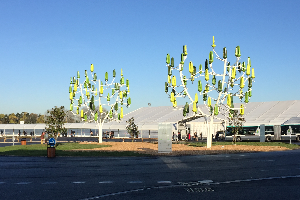
Na véspera da Cimeira do Clima, durante o debate sobre o clima na Câmara fiz um apelo ao primeiro-ministro Rutte para também dar atenção no debate e na cimeira, à emissão de gases de efeito estufa causada pela pecuária. Podemos realizar o mais rápido lucro para o clima quando comermos menos produtos provenientes de animais e advogarmos por uma agricultura sustentável. No novo acordo do clima não consta nenhuma combinação sobre a diminuição dos gases de efeito estufa na agricultura, apesar da pecuária ser, como provavelmente já se sabe, o causador número 1 da emissão de gases de efeito estufa no mundo.
Em Paris nos deixamos informar sobre a maneira pela qual novos acordos sobre a limitação da emissão de gases de efeito estufa e sobre a adaptação à mudança do clima são feitos em nível internacional. Também mantivemos conversas com precursores da vida económica, indústria e comércio que estão convencidos de que ‘business as usual’ já não é mais uma opção, como o CEO Fijke Sijbesma do DSM e Peter Bakker do World Council for Sustainable Development. Esta informação nós poderemos usar nos debates seguintes à Cimeira do Clima na Câmara Baixa. Pois já que o acordo do clima foi aceito, é claro que devemos prosseguir com acção!
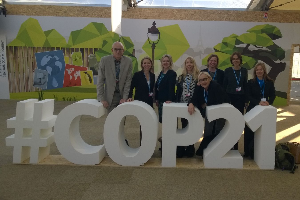
Nossa delegação da Câmara Baixa na Cimeira do Clima em Paris
Este mês também houve na Câmara o debate mais importante sobre agricultura e natureza: o debate sobre o orçamento. Além de pedir atenção para, entre outros, a bio-indústria, os animais de laboratório e a caça, eu pedi ao governo para continuar investindo na natureza do Caribe holandês. Lá vivem cerca de 275 espécies de animais e de plantas. Investir na natureza muitas vezes é considerado um hobby caro. Mas pesquisas mostram que cada euro investido pelo governo na natureza se recobra amplamente. Isto certamente é o caso nas ilhas do Caribe onde se estabeleceu um modelo de receita único e sobretudo sustentável que serve de exemplo para muitos outros países.
Também advogamos por mais dinheiro para pesquisar alternativas para as experiências com animais. Centenas de milhões de euros são investidos em experiências com animais, mas as grandes descobertas para o bem da saúde não ocorrem. Sempre mais cientistas admitem que experiências com animais na verdade frequentemente atrasam o progresso da medicina. Durante este debate também pleiteamos um orçamento adicional para a Autoridade Holandesa para a Segurança Alimentar e Económica afim de vigiar o bem-estar dos animais.
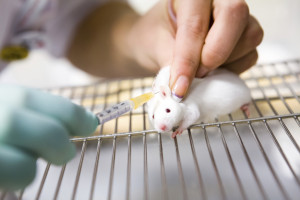
Por ocasião do debate nós obtivemos alguns belos êxitos: assim, graças à nossa moção, o cruel atordoamento com CO2 nos matadouros de porcos vai acabar e o governo deve instar as províncias para acabar com a matança em massa de gansos e para se empenhar por uma maneira mais eficaz e mais amigável aos animais de controle de danos nos campos com a assim chamada Agrilaser.
Esta semana eu também tomei parte numa transmissão da CCTV America sobre os efeitos da indústria pecuária no meio-ambiente, junto com Kip Andersen. Ele é o director de Cowspiracy, um filme documentário sobre o impacto desastroso da indústria de gado leiteiro na mudança do clima. A entrevista pode ser vista aqui.
Bettina Jung e Martin Buschmann – representantes de nosso partido irmão na Alemanha: Partei Mensch Umwelt Tierschutz – apresentaram juntamente com 30 membros uma petição assinada por nada menos que 32.000 pessoas contra experiências com animais em Hamburgo à prefeitura de Hamburgo. Muito boa acção!
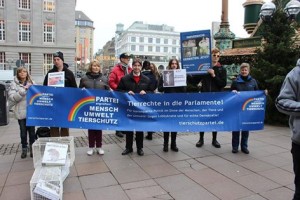
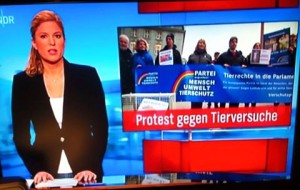
Atenciosamente,
Marianne
At the beginning of December, I was head of delegation of our Lower House committee joining the 2015 Climate Change Conference in Paris. After a successful train journey we received a warm welcome by the Dutch delegation office. Directly on our first day, we visited several pavilions where countries demonstrated how they were tackling climate change. In addition, there were many workshops and lectures on topics such as deforestation, sustainable agriculture, carbon pricing and climate funding.
It has been rewarding to see that the focus during these side events was on concrete climate action. A stroll past the numerous NGO stands in the so-called Climate Generation Areas confirmed this. On our way there, trees catching wind and thereby able to produce energy, attracted a lot of attention from the conference participants.

On the eve of the climate conference, I urged Prime Minister Rutte during our climate debate in Parliament to also give consideration to the greenhouse gas emissions caused by livestock farming during the climate debate and the climate conference. By far the most climate benefits can be achieved by eating less animal products and by advocating sustainable agriculture. The new climate deal does not mention agreements on reducing greenhouse gases in agriculture, and as you may already know, livestock farming is the number one cause of greenhouse gas emissions in the world.
In Paris, we have obtained information on how agreements are reached at an international level about reducing greenhouse gases and adapting to climate change. We have also held discussions with business pioneers including CEO Fijke Sijbesma of DSM (Dutch Sciences Company) and Mr Peter Bakker of the World Council for Sustainable Development, who strongly believe that business as usual is no longer an option. We will be able to use this information during the Dutch Lower House debates following the climate conference. After all, now the climate deal has been accepted, it is time to take action!
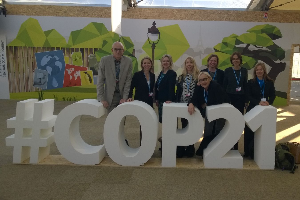
Our Lower House delegation at the climate conference in Paris
December has also been the month of the most important Lower House debate on agriculture and nature: the budgetary debate. As well as attention for factory farming, animal testing and hunting, I have asked the government to keep investing in Dutch Caribbean wildlife. These islands are the habitat of no less than 275 animal and plant species. Investing in plants and wildlife is often considered to be an expensive hobby. However, research has shown that each penny spent by the government on wildlife more than pays for itself. This is certainly the case with the Caribbean islands, where a unique and above all sustainable income model has been created, which serves as a model for many other countries.
We have also called for more funding for alternatives to animal testing. Although hundreds of millions of euros are invested in animal testing, there still have not been any major health breakthroughs. More and more scientists have admitted that in many cases, animal testing is in fact slowing down medical advances. During the debate, we have also called for an additional budget for the Netherlands Food and Consumer Product Safety Authority to be used for monitoring animal welfare.

The debate has led to some successful results: for a start, our motion will put an end to the cruel carbon dioxide stunning of pigs in slaughterhouses. In addition, our government must stimulate the provinces to stop the massive killing of geese and commit themselves to a more effective and animal friendly way of damage control on the fields by means of the so-called Agrilaser.
This week I have also worked with Kip Andersen on an episode of CCTV America about the impact of livestock on the environment. Andersen is the director of Cowspiracy, a documentary on the devastating impact of dairy farming on climate change. You can watch the interview here.
Bettina Jung and Martin Buschmann – representatives of our German sister party Partei Mensch Umwelt Tierschutz – together with about 30 other members have handed over a 32,000-signature petition against animal testing in Hamburg at the City Hall of Hamburg. A great step!


Kind regards,
Marianne